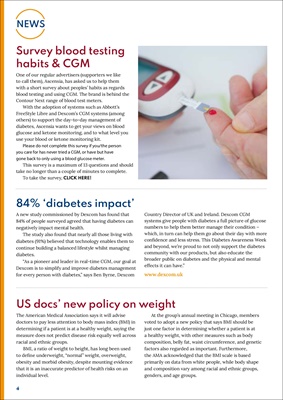
4
NEWS
84% 'diabetes impact'
A new study commissioned by Dexcom has found that
84% of people surveyed agreed that having diabetes can
negatively impact mental health.
The study also found that nearly all those living with
diabetes (91%) believed that technology enables them to
continue building a balanced lifestyle whilst managing
diabetes.
"As a pioneer and leader in real-time CGM, our goal at
Dexcom is to simplify and improve diabetes management
for every person with diabetes," says Ben Byrne, Dexcom
Country Director of UK and Ireland. Dexcom CGM
systems give people with diabetes a full picture of glucose
numbers to help them better manage their condition -
which, in turn can help them go about their day with more
confidence and less stress. This Diabetes Awareness Week
and beyond, we're proud to not only support the diabetes
community with our products, but also educate the
broader public on diabetes and the physical and mental
effects it can have."
www.dexcom.uk
Survey blood testing
habits & CGM
One of our regular advertisers (supporters we like
to call them), Ascensia, has asked us to help them
with a short survey about peoples' habits as regards
blood testing and using CGM. The brand is behind the
Contour Next range of blood test meters.
With the adoption of systems such as Abbott's
FreeStyle Libre and Dexcom's CGM systems (among
others) to support the day-to-day management of
diabetes, Ascensia wants to get your views on blood
glucose and ketone monitoring, and to what level you
use your blood or ketone monitoring kit.
Please do not complete this survey if you/the person
you care for has never tried a CGM, or have but have
gone back to only using a blood glucose meter.
This survey is a maximum of 13 questions and should
take no longer than a couple of minutes to complete.
To take the survey, CLICK HERE!
US docs' new policy on weight
The American Medical Association says it will advise
doctors to pay less attention to body mass index (BMI) in
determining if a patient is at a healthy weight, saying the
measure does not predict disease risk equally well across
racial and ethnic groups.
BMI, a ratio of weight to height, has long been used
to define underweight, "normal" weight, overweight,
obesity and morbid obesity, despite mounting evidence
that it is an inaccurate predictor of health risks on an
individual level.
At the group's annual meeting in Chicago, members
voted to adopt a new policy that says BMI should be
just one factor in determining whether a patient is at
a healthy weight, with other measures such as body
composition, belly fat, waist circumference, and genetic
factors also regarded as important. Furthermore,
the AMA acknowledged that the BMI scale is based
primarily on data from white people, while body shape
and composition vary among racial and ethnic groups,
genders, and age groups.